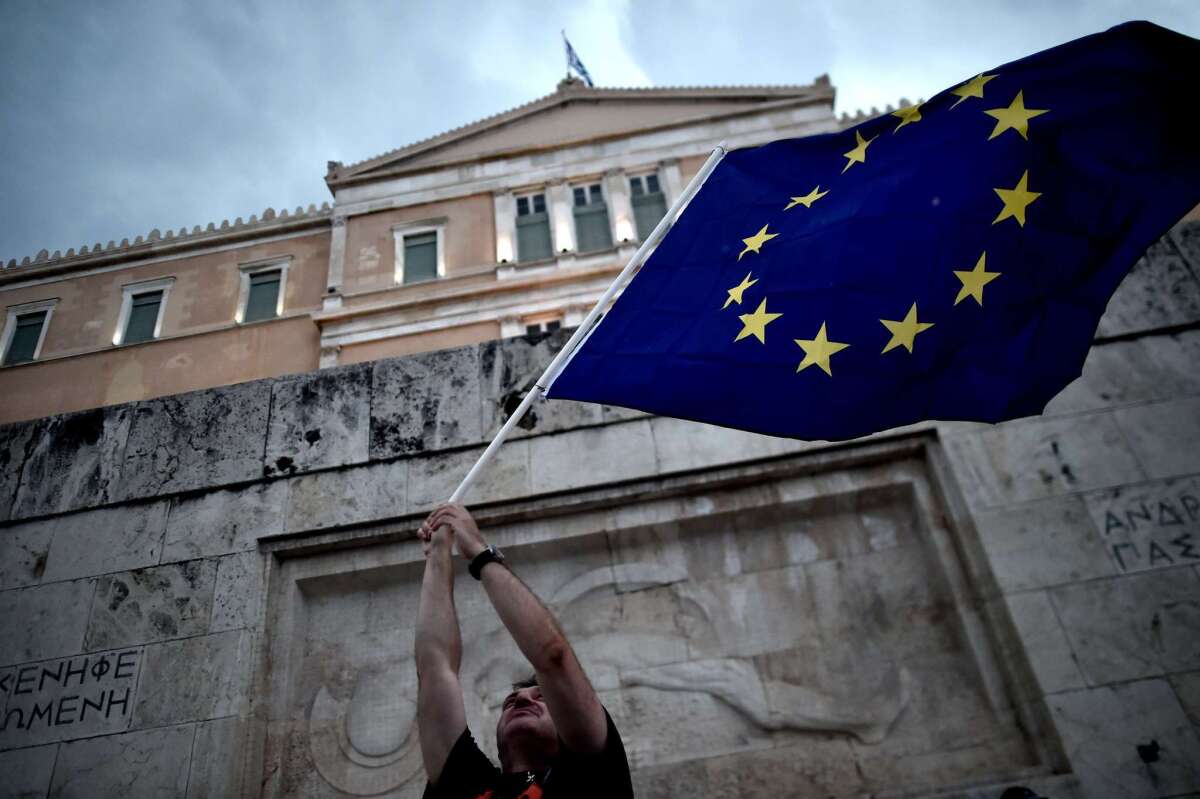Greece’s debt crisis: Where the key players currently stand

A demonstrator waves a European Union flag during a rally in Athens on June 30 in support of a bailout deal.
Finance ministers from the Eurozone countries agreed Wednesday to delay negotiations on a new bailout deal for Greece until its divided and crisis-weary people decide in a Sunday referendum if they are willing to endure more belt-tightening to keep the euro as their currency.
That pause in the pursuit of an agreement between Athens and the international institutions from which Greece has borrowed $270 billion over the last five years creates a four-day vacuum at a time when social unrest threatens to escalate.
The decision by the Eurozone finance chiefs to, as one said, “not put the cart before the horse” also exposes a rift between Greek leaders and their lenders on the significance of the upcoming vote. The creditors -- the International Monetary Fund, the European Central Bank and the European Commission -- see the vote as Greeks’ final verdict on whether to stay in the Eurozone, even though the Athens government insists its negotiators will be at the bargaining table Monday whatever the outcome.
Following are the positions and expectations of the various stakeholders in the Greek financial drama:
Greek government
Prime Minister Alexis Tsipras executed an apparent about-face in a letter to creditors late Tuesday that said his government was “prepared to accept” the demands for new austerity measures laid out by the lenders last week and categorically rejected by Greece at that time. The capitulation, however, is contingent on gaining a two-year extension of the bailout program to provide Athens with more financial lifelines to go along with the reform and repayment plans.
In spite of that seesaw, Tsipras reiterated his call to Greek voters to reject the lenders’ demands that Athens raise the money it needs to keep up with debt payments by making deeper cuts to spending on pensions and salaries rather than heaping the burden on business with new taxes that could stifle growth.
Eurozone countries
The finance ministers of the 19 countries that share the euro currency -- and hold most of Greece’s debt -- at least temporarily resolved a division emerging within the Eurozone over whether to resume talks with Athens immediately or wait for the Greek people to have their say Sunday.
“We see no grounds for further talks at this point,” said Jeroen Dijsselbloem, chairman of the Eurozone forum. He pointed to the Athens government’s rejection of the creditors’ last proposal and its advice to voters to reject it Sunday.
German Chancellor Angela Merkel had said after the bailout program expired Tuesday that there was little sense in negotiating until the voters have spoken. French President Francois Hollande, however, warned Wednesday that letting the volatile situation fester for four days would amount to a “leap into the void.”
The Greek public
Polls have long suggested a majority of Greeks want to stay in the Eurozone, but resentment of the austerity measures may be eroding that support. A survey conducted Sunday through Tuesday by the ProRata institute and published Wednesday in Greek media showed 54% of respondents planning to vote against the deal offered by the creditors last week.
Signs were mixed on the streets of Athens. Trade unionists unfurled a banner at the Finance Ministry urging citizens to vote “NO to blackmail and austerity.” A few hours later it was taken down.
Protests were smaller and more scattered than those that have been held almost daily outside the Parliament building, perhaps because of the crush of pensioners lined up outside banks that opened only for them to withdraw as much as $132 of their monthly paychecks deposited Tuesday.
Other Greeks are limited to $66 a day in withdrawals from ATMs, drawing flocks of those who might otherwise have joined the protests.
Greek Orthodox Church
With anger and public protest rising across the nation of 11 million, Archbishop Ieronymos II of the Greek Orthodox Church urged calm among the religious flock to prevent the deepening social divide from swelling into violent confrontation.
“We must not let the poison of division touch our hearts.... It would be a crime committed against future generations,” he said in warning of the risks of confrontation.
Council of Europe
The head of the Council of Europe, the continent’s collective human rights institution, said Greece’s referendum will fall short of international standards if held as planned.
Council Secretary-General Thorbjorn Jagland told the Associated Press that at least two weeks’ notice of a referendum is recommended to allow time for the government to formulate a clear question, for the public to debate the issue and the international community to assemble observers to monitor the process.
Tsipras announced the referendum Saturday when his government walked out of the talks with creditors.
Global markets
The positive signal from Athens spurred a recovery on markets across Europe and Asia after two days of selloff by investors concerned about spillover for the global economy. Britain’s FTSE 100 gained 1.34% and Germany’s DAX index rose 2.15% as European traders took Tsipras’ flip-flopping as a hopeful sign that a worsening of the crisis can be averted.
Follow @cjwilliamslat for the latest international news 24/7
More to Read
Start your day right
Sign up for Essential California for news, features and recommendations from the L.A. Times and beyond in your inbox six days a week.
You may occasionally receive promotional content from the Los Angeles Times.







